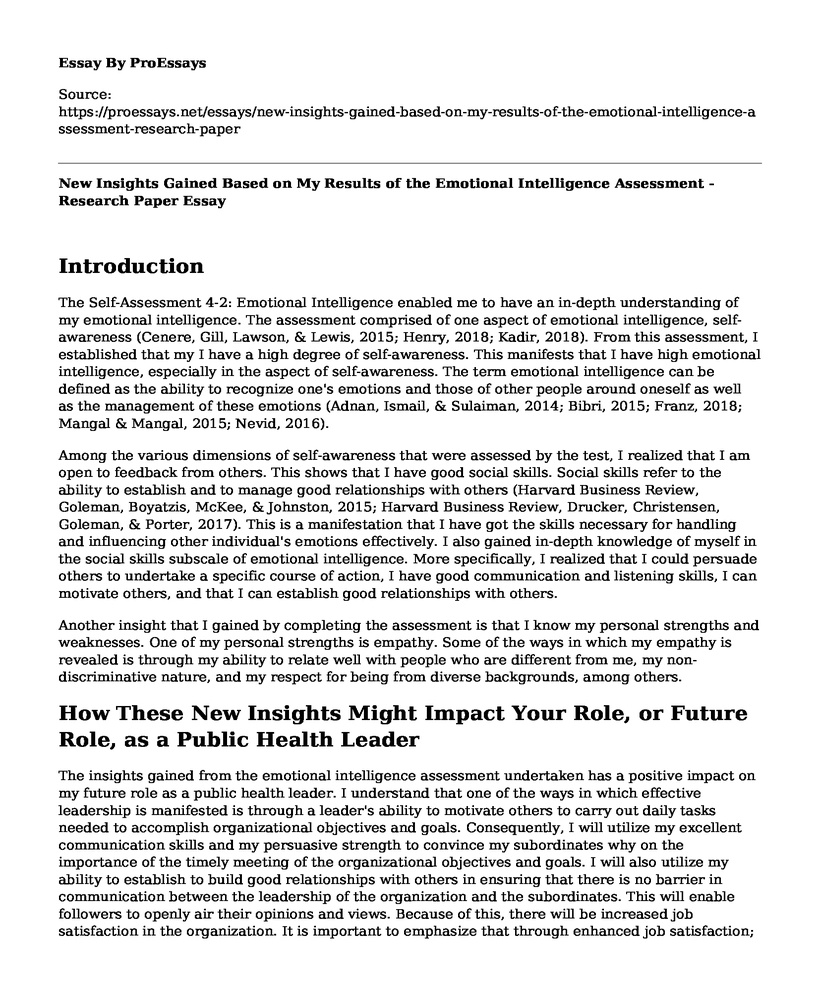Introduction
The Self-Assessment 4-2: Emotional Intelligence enabled me to have an in-depth understanding of my emotional intelligence. The assessment comprised of one aspect of emotional intelligence, self-awareness (Cenere, Gill, Lawson, & Lewis, 2015; Henry, 2018; Kadir, 2018). From this assessment, I established that my I have a high degree of self-awareness. This manifests that I have high emotional intelligence, especially in the aspect of self-awareness. The term emotional intelligence can be defined as the ability to recognize one's emotions and those of other people around oneself as well as the management of these emotions (Adnan, Ismail, & Sulaiman, 2014; Bibri, 2015; Franz, 2018; Mangal & Mangal, 2015; Nevid, 2016).
Among the various dimensions of self-awareness that were assessed by the test, I realized that I am open to feedback from others. This shows that I have good social skills. Social skills refer to the ability to establish and to manage good relationships with others (Harvard Business Review, Goleman, Boyatzis, McKee, & Johnston, 2015; Harvard Business Review, Drucker, Christensen, Goleman, & Porter, 2017). This is a manifestation that I have got the skills necessary for handling and influencing other individual's emotions effectively. I also gained in-depth knowledge of myself in the social skills subscale of emotional intelligence. More specifically, I realized that I could persuade others to undertake a specific course of action, I have good communication and listening skills, I can motivate others, and that I can establish good relationships with others.
Another insight that I gained by completing the assessment is that I know my personal strengths and weaknesses. One of my personal strengths is empathy. Some of the ways in which my empathy is revealed is through my ability to relate well with people who are different from me, my non-discriminative nature, and my respect for being from diverse backgrounds, among others.
How These New Insights Might Impact Your Role, or Future Role, as a Public Health Leader
The insights gained from the emotional intelligence assessment undertaken has a positive impact on my future role as a public health leader. I understand that one of the ways in which effective leadership is manifested is through a leader's ability to motivate others to carry out daily tasks needed to accomplish organizational objectives and goals. Consequently, I will utilize my excellent communication skills and my persuasive strength to convince my subordinates why on the importance of the timely meeting of the organizational objectives and goals. I will also utilize my ability to establish to build good relationships with others in ensuring that there is no barrier in communication between the leadership of the organization and the subordinates. This will enable followers to openly air their opinions and views. Because of this, there will be increased job satisfaction in the organization. It is important to emphasize that through enhanced job satisfaction; the employees will be able to attain high productivity.
It is also crucial to mention that contemporary organizational leadership is characterized by the presence of employees from a diverse cultural, socio-economic, and religious background. Consequently, I will utilize my good empathetic skills to ensure that members from diverse backgrounds have their rights, views, and opinions respected. Through this, I will be able to unite all employees toward a common goal.
References
Adnan, R., Ismail, S. I., & Sulaiman, N. (2014). Proceedings of the international colloquium on sports science, exercise, engineering and technology 2014(ICoSSEET 2014). New York, NY: Springer Publishing.
Bibri, S. E. (2015). The human face of ambient intelligence: cognitive, emotional, affective, behavioral and conversational aspects. New York, NY: Springer Publishing.
Cenere, P., Gill, R., Lawson, C., & Lewis, M. (2015). Communication skills for business professionals. Cambridge, UK: Cambridge University Press.
Franz, L. (2018). Emotional intelligence: a guide to improving emotion control and understanding relationships. New York, NY: PublishDrive Publishing.
Harvard Business Review, Drucker, P. F., Christensen, C. M., Goleman, D., & Porter, M. E. (2017). HBR's 10 must reads boxed set with bonus emotional intelligence (7 books)(HBR's 10 Must Reads). Boston, MA: Harvard Business Press.
Harvard Business Review, Goleman, D., Boyatzis, R. E., McKee, A., & Johnston, F. (2015). Mindful leadership: emotional intelligence collection (4 books). Harvard Business Review Press.
Henry, A. E. (2018). Understanding strategic management. Oxford, OX: Oxford University Press.
Kadir, B. (2014). Multidimensional perspectives on principal leadership effectiveness. Pennsylvania, PA: IGI Global Publishing.
Mangal, S. K., & Mangal, S. (2015). Emotional intelligence: managing emotions to win in life. New Delhi, India: PHI Learning Pvt. Ltd.
Nevid, J. S. (2016). Essentials of psychology: concepts and applications. Boston, MA: Cengage Learning.
Cite this page
New Insights Gained Based on My Results of the Emotional Intelligence Assessment - Research Paper. (2022, Dec 17). Retrieved from https://proessays.net/essays/new-insights-gained-based-on-my-results-of-the-emotional-intelligence-assessment-research-paper
If you are the original author of this essay and no longer wish to have it published on the ProEssays website, please click below to request its removal:
- Project Portfolio Office, Project Management Office and Program Management Office
- Importance of Data in Decision-Making Essay
- Self-Reflection and Creative Counselling Techniques Essay
- Personal Leadership Training Plans: Knowledge
- Teamwork, Collaboration, Communication, and Knowledge Sharing Paper Example
- Essay Example on Can Authoritarian Leadership Work in Modern America?
- Postpartum Depression Screening: An Essential Activity - Essay Sample







